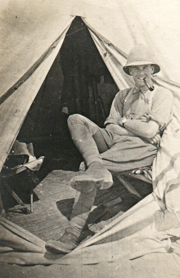Up early, Powell and Kenning rode over this morning. The batteries had just been bivouacking on the east bank of the canal. About five thousand New Zealand and Australian Cavalry have been pouring through on their way to Katia. The latest report we've got is that Katia is completely burnt and the Turks have annihilated two squadrons of the Worcester Yeomanry, and the Gloucester and Warwickshire Yeomanry who were also at Katia have been badly cut up. Wounded men pouring in most of the morning and several lots of Turkish prisoners. Our casualties up to this morning were reckoned at 300 and 7 dead, and 430 wounded Turks have been found (at Duedar, a post held by the 7th Royal Scots) between us and Katia.
I was busy all day striking the camp and sending it over to the East Bank.
I heard this afternoon that our battery has been asked to push on to Road End, which is the place where the engineers have got to with the road to Katia. I wonder if they will come into action at all; I do hope I can get on to them tomorrow.
Hundreds of colonial troops have been coming in here all day. I had a bathe at midday and busy striking tents and loading wagons for the rest of the day.



Early in the morning eight aeroplanes passed over, en route for Katia. It was subsequently learned that they had dropped bombs on parties of the enemy grouped under the palm trees, and had effected considerable damage. The absence of any further news of an action led to some depression, which was instantly dispelled when the Battery itself was selected to proceed to the scene of action: Hill 70, seven miles distant from Kantara. On arrival there it was found that the Worcesters and the Warwicks had sustained heavy casualties on the previous day. A day's work was spent in improving the gun emplacements until they were practically ideal from the point of view of protection, cover and comfort. Twelve Bedouin prisoners were brought in. They were without uniform and dressed in the ordinary Arab garb. The Battery - which was the first to leave the canal and march into the desert of Sinai - now obtained the first impressions of desert warfare.